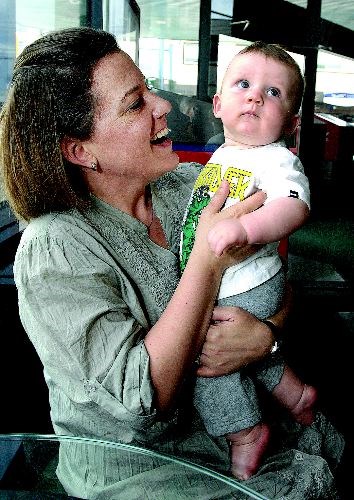Eryn Collins-Ellery bristled at the terminology, but she's proud to be what's now considered a "geriatric mom."
"I was horrified that when I got pregnant that mine was going to be considered a geriatric pregnancy because I was going to be 37 or older when I delivered," she said. "I think they might be trending away from that term because it's a little on the offensive side, but I am an older mother and I have to deal with that and I'm sure I'll notice that when Thomas gets older."
Collins-Ellery, 38, is among an increasing number of BC women getting pregnant after their 35th birthday. In 1986 fewer than one in 10 babies in the province were born to women over 35, now almost one quarter of all births are from that cohort.
The older mothers are often in a more stable situation both economically and socially than their younger counterparts but can also be at higher risk for complications during their pregnancies.
Collins-Ellery was fortunate -- aside from a few extra appointments with her midwife and a few more tests, things went smoothly and her son Thomas was born healthy. Although Thomas is her first biological child, she also has a pair of step children.
Her case is typical. Most older mothers and their children don't have any problems during and after pregnancy, but BC deputy provincial health officer Dr. Evan Adams said they should be aware of the risks, especially when fertility treatments are involved. He pointed to the rise, albeit slight, in the provincial infant mortality rate in 2010 which he attributes in part to older women getting pregnant.
"Those older women (sometimes) use artificial reproductive technologies and have multiple births," he said. "It's actually these assisted pregnancies with multiple births that are increasing infant mortality."
With artificial fertility practices becoming ever more common, medical ethics experts have begun to weigh in on how doctors should advise their patients when older mothers want to try to get pregnant.
"There are many reasons why older parents having children might be a commendable moral act," Art Caplan, director for bioethics at the University of Pennsylvania wrote in a recent paper. "But there are also a host of reasons for concern based on the safety of pregnancy for older women, risks posed to children delivered by older mothers, issues around what constitutes safe conditions for having a child relative to the age of the parents, and lack of data on the impact of older parenting within and outside marriage on children."
Caplan and co-author Dr. Pasquale Patrizio concluded in their study Are You Ever Too Old to Have a Baby published in Seminars in Reproductive Medicine that a set of international standards should be set up for fertility clinics to protect the interests of mothers and babies alike.
Collins-Ellery acknowledged that a risk exists, but said that shouldn't scare off women who want to try to get pregnant in their mid-to-late 30s.
"I know a few people that are older than I am now who are thinking about having kids and wondering whether or not they're too old and should they not even try," she said. "It has been a positive experience for me. . . . I was just in a really good place in my life in terms of stability and having a career underway and the support there to be able to do it."
She said the added life experience she's gained watching friends and family members raise children helped her to be more prepared when Thomas came along.
Despite the increased risk, Adams also doesn't think that older women should be discouraged from getting pregnant or using additional fertility techniques. Instead he wants to see more supports put in place to help.
"I believe in the right of the individual to decide. If a woman wants to have a baby at 18 or at 43, that is their choice," he said. "Each carries a risk. The teenager has the social risk of limiting her social opportunities, the older mother has the risk of having the poor outcome from the biological point of view."



